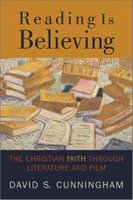 Cunningham ends his series of literary reflections on the Apostles' Creed by noting the presence of the final word: 'Amen':
Cunningham ends his series of literary reflections on the Apostles' Creed by noting the presence of the final word: 'Amen':'...creeds are not mere laundry lists of statements about the Christian faith. In fact they are really much more like prayers. When we say them, we are not merely announcing what we think or describing the state in which we find ourselves; we are also asking God for help and guidance in living into the faith that the creeds attempt to articulate. We are confessing our faith, but we are also confessing our unfaith...
...Our tendency to inhabit the borderlands between faith and unfaith is not new. It is not merely a recent development brought on by life in an increasingly secular age. In fact, it has been typical of the way that people have responded to the gospel of Jesus Christ through the ages....
...In his Confessions, Augustine offers a wonderful description of the long and arduous path[,] that he wandered through the equally attractive lands of faith and of doubt until he finally came to realize that "our hearts are restless until they rest in God." And what Christian has not been beguiled by the beautiful story in the Gospel of Mark, in which the father of the sick child is told that all power and possibility is dependent upon his ability to believe? He cries out to Jesus, as would we all, "I believe; help my unbelief"...
...Perhaps these stories [quoted in the previous chapters] can even help transform our perception of the Apostles' Creed (and other statements of Christian belief) from a suspiciously antiquated checklist of beliefs in to a heart-felt and life-transforming prayer--a prayer that we can utter in the spirit of a bereaved parent who cries out, "I believe; help my unbelief!" and a prayer to which we can, with confidence and joy, say "Amen."'
(Reading is Believing, pp. 235-6)
No comments:
Post a Comment